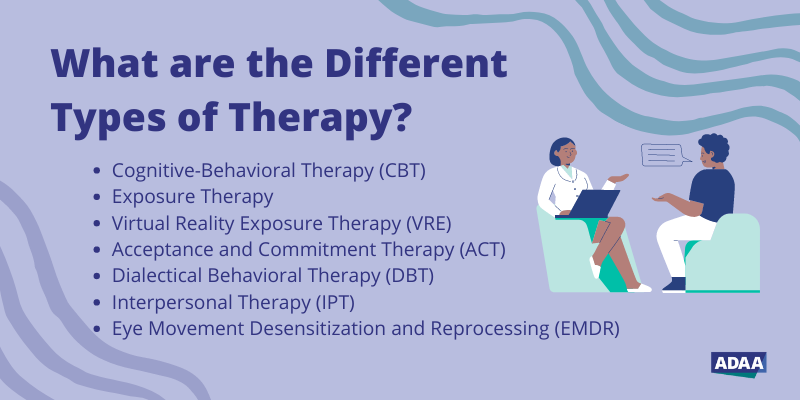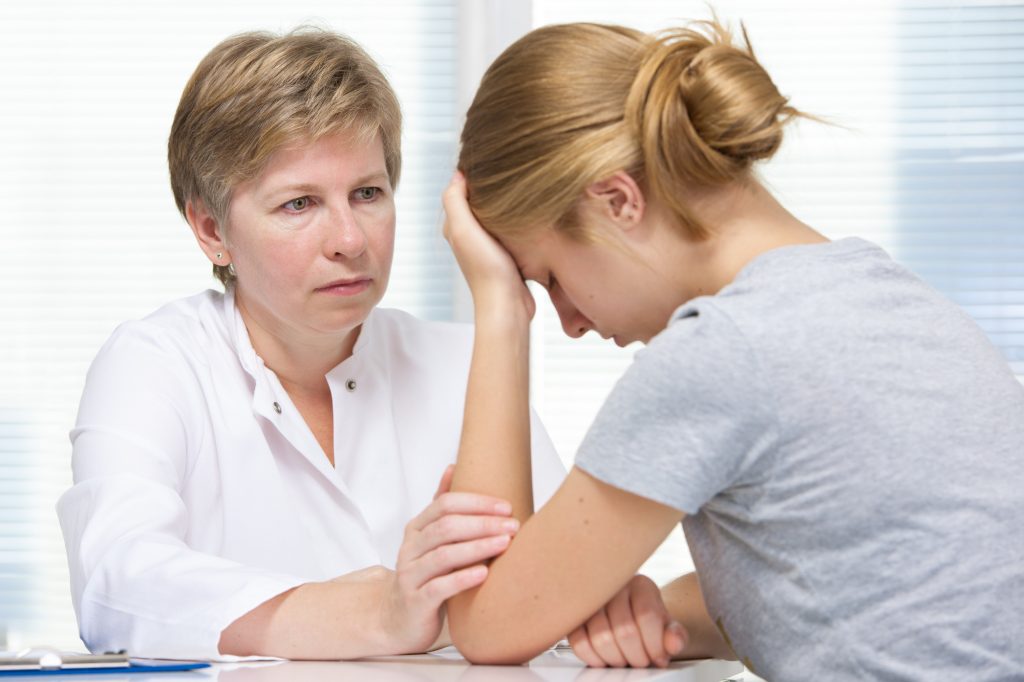Start your process with counselling for anxiety disorder guided by professionals
Checking Out Different Methods in Coaching for Anxiousness Condition for Long Lasting Adjustment
When tackling stress and anxiety conditions, it's important to explore a variety of counseling methods. Each technique uses special understandings and devices to assist you manage your signs successfully. You may discover that integrating methods can produce the most effective results. Nevertheless, comprehending the subtleties of these methods is key to fostering long lasting modification. Suppose the best combination could launch a brand-new level of emotional health for you?
Recognizing Stress And Anxiety Conditions: A Brief Summary
Stress and anxiety disorders, which impact millions of individuals worldwide, can greatly influence life. You may experience overwhelming sensations of anxiety or fret that seem uncontrollable. These feelings can result in physical signs and symptoms like a racing heart, sweating, and even wooziness. Typical kinds of stress and anxiety disorders consist of generalized stress and anxiety problem, panic condition, and social anxiety condition. Each has unique indicators, however they all share a tendency to interrupt your routine and relationships.Understanding the source of your stress and anxiety is vital. It may stem from genes, mind chemistry, or life experiences. Recognizing your triggers can aid you manage your feedbacks better. It is very important to bear in mind that you're not alone in this battle. Many individuals encounter comparable obstacles, and seeking assistance is a strong step toward feeling better. By discovering about stress and anxiety disorders, you're currently on the course to understanding and managing your condition extra properly.
Cognitive-Behavioral Therapy: Testing Unfavorable Thought Patterns
In Cognitive-Behavioral Treatment, you'll start by identifying the adverse thought triggers that add to your anxiety. You'll function on replacing them with more positive options as soon as you recognize these ideas. Together, you'll develop reliable coping approaches to aid manage your anxiety in everyday situations.
Identifying Negative Thought Triggers

When you come across minutes of distress, identifying the details triggers behind your adverse ideas can be important in handling stress and anxiety. Begin by taking note of situations that prompt sensations of concern or anxiety. Is it a jampacked area, an approaching deadline, or a discussion with particular individuals? Write down these instances in a journal. This will certainly assist you determine patterns in your thinking. Notification physical feelings that accompany your negative ideas, like an auto racing heart or rigidity in your breast. By determining these triggers, you gain insight into what's fueling your stress and anxiety. Comprehending these connections is the primary step in challenging those ideas and inevitably reclaiming control over your psychological reactions.
Changing Ideas With Positives
Challenging unfavorable idea patterns is a necessary step in changing your state of mind and decreasing anxiousness. You may commonly find yourself caught in cycles of insecurity or catastrophic thinking. Rather of allowing these ideas determine your feelings, technique changing them with positive affirmations or sensible choices. As an example, when you think, "I can not handle this," move it to, "I can take care of difficulties one action at once." This easy modification can significantly influence your emotional state. Regularly recognizing and countering these unfavorable ideas aids produce a healthier interior discussion. Remember, it takes some time and effort, yet consistently exercising this method can bring about long lasting change, equipping you to deal with anxiousness with restored self-confidence and strength.
Structure Coping Strategies Together
Replacing negative thoughts is only the start of taking care of anxiousness effectively. To produce long-term modification, you need to construct coping strategies that equip you. Cognitive-Behavioral Therapy (CBT) helps you determine and challenge those purposeless thought patterns. With each other, you and your therapist can check out how these thoughts influence your feelings and behaviors.Start by developing practical strategies, like journaling or mindfulness workouts, that enable you to confront anxiety head-on. When you face your fears gradually, you'll learn to respond in different ways.

Mindfulness and Acceptance-Based Approaches: Cultivating Present-Moment Recognition
As you navigate the intricacies of anxiety, including mindfulness and acceptance-based methods can substantially boost your capability to cultivate present-moment awareness. By concentrating on the present moment, you'll find that you can observe your thoughts and sensations without judgment (Counseling services for anxiety). This method helps you recognize your anxiousness without feeling overwhelmed by it.Engaging in mindfulness exercises, such as deep breathing, body scans, or led reflections, allows you to ground on your own in your existing experience. Acceptance-based approaches encourage you to accept your emotions instead than deal with against them. They shed their power over you.Incorporating these practices right into your day-to-day routine can transform just how you react to anxiety when you accept your feelings. You'll develop durability and discover to browse difficult scenarios with better ease. Ultimately, cultivating present-moment awareness lays the foundation for long lasting modification, equipping you to lead a much more satisfying life
Exposure Therapy: Facing Concerns Progressively
Direct exposure therapy helps you face your anxieties in a gradual method, making it much less overwhelming. You'll discover strategies to face anxiety-provoking scenarios step by step, while likewise constructing coping techniques to manage your responses. This strategy encourages you to take control and decrease anxiety gradually.
Gradual Direct Exposure Methods

When facing anxiousness, slowly facing your worries can be a powerful means to gain back control. This technique, recognized as progressive direct exposure, includes gradually subjecting on your own to the circumstances or things that activate your anxiety. Begin with much less challenging situations and gradually function your method approximately more difficult ones. For instance, if you're afraid of public talking, you may start by talking in front of a mirror, then proceed to sharing thoughts with a pal, and at some point deal with a tiny group. Each action helps desensitize you to the anxiety, building your self-confidence over time. Keep in mind, it's necessary to speed on your own and celebrate little success as you relocate through this process, strengthening your capacity to take care of anxiety efficiently.
Structure Coping Approaches
Structure effective coping techniques is vital for taking care of anxiety, especially as you confront your fears gradually - Counseling services for anxiety. One powerful technique is exposure therapy, where you start by facing your worries in a controlled way. Begin with less daunting circumstances and slowly work your method as much as more difficult circumstances. This steady exposure aids desensitize you to anxiety activates, making them much less overwhelming.Incorporate leisure techniques, such as deep breathing or mindfulness, to soothe your mind throughout direct exposure. Track your progress, commemorating small triumphes along the method to enhance your confidence. Bear in mind, it's alright to take your time; the goal isn't excellence however constant improvement. By developing these techniques, you'll equip on your own to browse anxiety and accept life much more totally
Psychodynamic Treatment: Discovering Root Reasons of Stress And Anxiety
Psychodynamic therapy discovers the subconscious mind, revealing the origin triggers of your anxiety. By analyzing your thoughts, sensations, and previous experiences, this method helps you reveal underlying problems and unsettled issues that might add to your current anxiousness. You'll deal with a specialist to check out youth experiences, relationships, and psychological patterns that shape your feedbacks today.As you gain insight right into these much deeper layers of your mind, you'll begin to recognize just how past events affect your present actions. This understanding can result in catharsis, permitting you to process feelings you could have suppressed.Through the therapeutic partnership, you can additionally determine protection mechanisms that might have created in time, supplying a clearer path to transform. Ultimately, psychodynamic therapy outfits you with the devices to address your stress and anxiety at its core, advertising lasting makeover in your emotional wellness.
Holistic and integrative Methods: Incorporating Strategies for Greater Efficacy
Integrating numerous healing website techniques can improve your trip towards managing stress and anxiety better. By combining aspects from cognitive-behavioral treatment, mindfulness practices, and alternative approaches, you can create a customized strategy that resolves your distinct requirements. As an example, you could use cognitive-behavioral techniques to challenge unfavorable idea patterns while integrating mindfulness workouts to ground on your own in the here and now moment.Additionally, checking out all natural techniques such as yoga exercise or reflection can advertise leisure and minimize stress and anxiety signs. This mix enables you to establish better self-awareness and resilience.Experimenting with these varied techniques can assist you uncover what reverberates most with you. Keep in mind, it has to do with discovering a harmony that works, as opposed to staying with a solitary technique. This integrative approach not only offers immediate relief but also promotes long-lasting skills for managing anxiety, empowering you to reclaim control over your life.
The Role of Assistance Equipments: Structure Strength With Connection
While it may seem that managing anxiousness is a solitary journey, having a solid support group can play a necessary function in your resilience. Bordering on your own with compassionate buddies, family members, or support teams produces a secure area where you can honestly share your feelings and experiences. When you get in touch with others, you advise yourself that you're not the only one in this struggle.These relationships supply support and can offer sensible coping techniques that have actually worked for others. It's also a possibility to gain point of view; pals can help you see situations differently, reducing sensations of isolation.Moreover, emotional support fosters a sense of belonging, which can significantly alleviate anxiousness signs. By leaning on your support system, you can construct resilience and tackle difficulties extra efficiently. Bear in mind, connecting for help signifies toughness, and it can make all the difference in your journey toward taking care of anxiousness.
Often Asked Inquiries
What Are the Usual Signs of Anxiousness Disorders?
You may experience uneasyness, tiredness, problem focusing, irritability, muscle mass stress, and rest disruptions. Physical symptoms can consist of quick heart beat, sweating, and trembling. Acknowledging these indications early can aid you look for suitable support and treatment.
Just How Long Does Treatment Generally Last for Stress And Anxiety Conditions?
Therapy for anxiety problems typically lasts anywhere from a few weeks to several months. It really depends on your specific needs, development, and the methods your therapist uses to help you handle your anxiousness successfully.
Can Medicine Be Used Alongside Therapy for Anxiousness?
Yes, medicine can certainly be used along with treatment for anxiety. Incorporating both strategies commonly improves therapy performance, assisting you manage signs and symptoms while checking out underlying problems through therapy (Counseling services for anxiety). Always consult your healthcare provider for tailored recommendations
Are There Self-Help Strategies for Taking Care Of Anxiousness?
Yes, there are a number of self-help techniques for handling anxiety. You can exercise mindfulness, engage in normal workout, maintain a balanced diet, develop a routine, and utilize deep breathing methods to help in reducing anxiousness signs and symptoms properly.
Just how Do I Know if I Required Specialist Assistance for Anxiety?
